NSB305: Professional Practice and Leadership Challenge Report - QUT
VerifiedAdded on 2022/10/04
|6
|1767
|356
Report
AI Summary
This report critically examines the professional practice and leadership challenges faced by Graduate Registered Nurses (GRNs), focusing on the issue of working within the scope of practice. The report identifies this as a primary challenge, discussing the difficulties new nurses encounter when their responsibilities extend beyond their training, often due to staffing shortages. It explores the implications of this challenge, including potential impacts on skill development, patient safety, and communication between experienced and new nurses. The report emphasizes the importance of transformational leadership in addressing these challenges and suggests that medical centers and nursing administration work together to provide effective on-the-job training and support for GRNs. The report provides both short-term and long-term implications of the challenges and concludes that the most significant issue is working within the scope of practice, which can hinder the professional development of nurses. The report references multiple sources to support its claims.
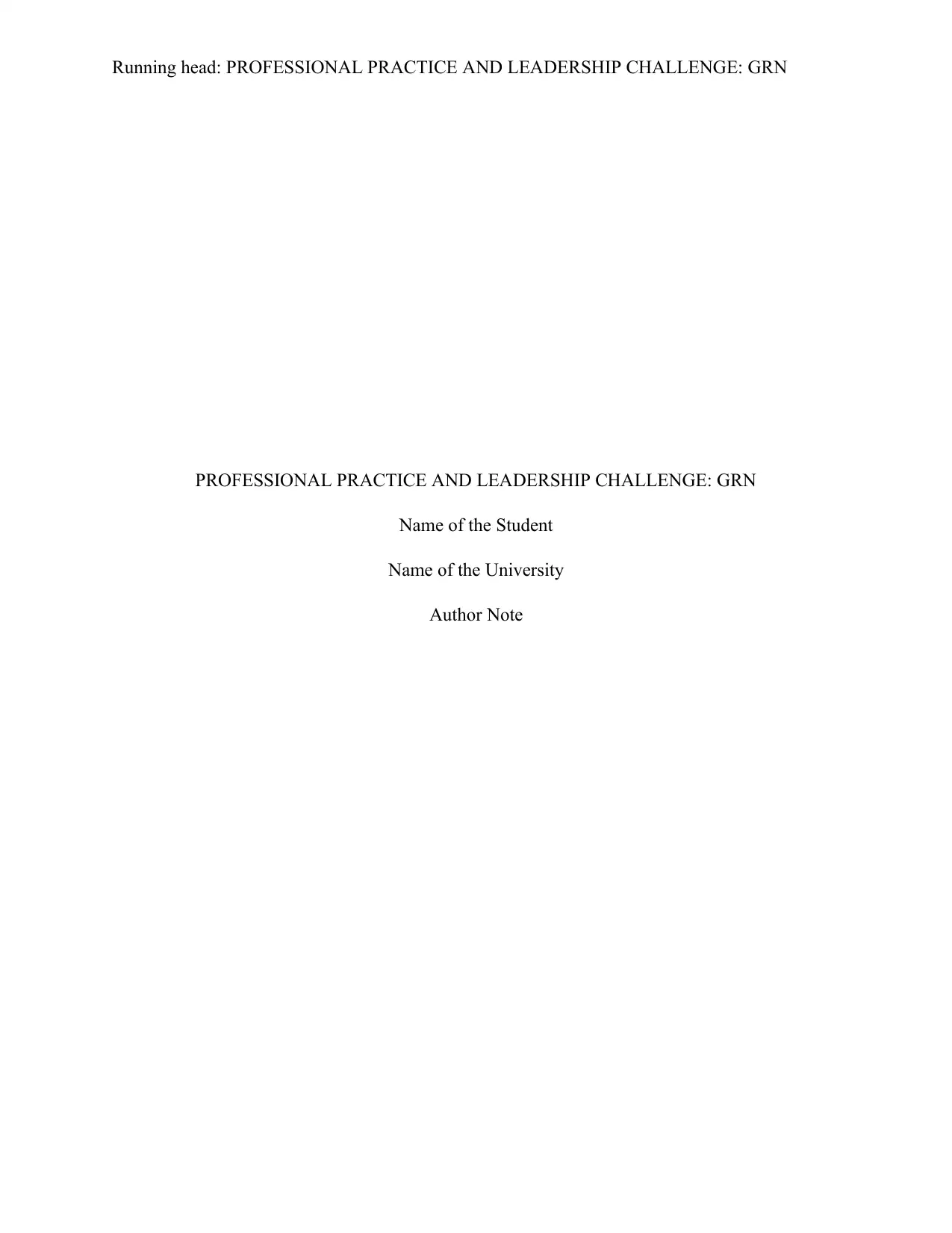
Running head: PROFESSIONAL PRACTICE AND LEADERSHIP CHALLENGE: GRN
PROFESSIONAL PRACTICE AND LEADERSHIP CHALLENGE: GRN
Name of the Student
Name of the University
Author Note
PROFESSIONAL PRACTICE AND LEADERSHIP CHALLENGE: GRN
Name of the Student
Name of the University
Author Note
Paraphrase This Document
Need a fresh take? Get an instant paraphrase of this document with our AI Paraphraser
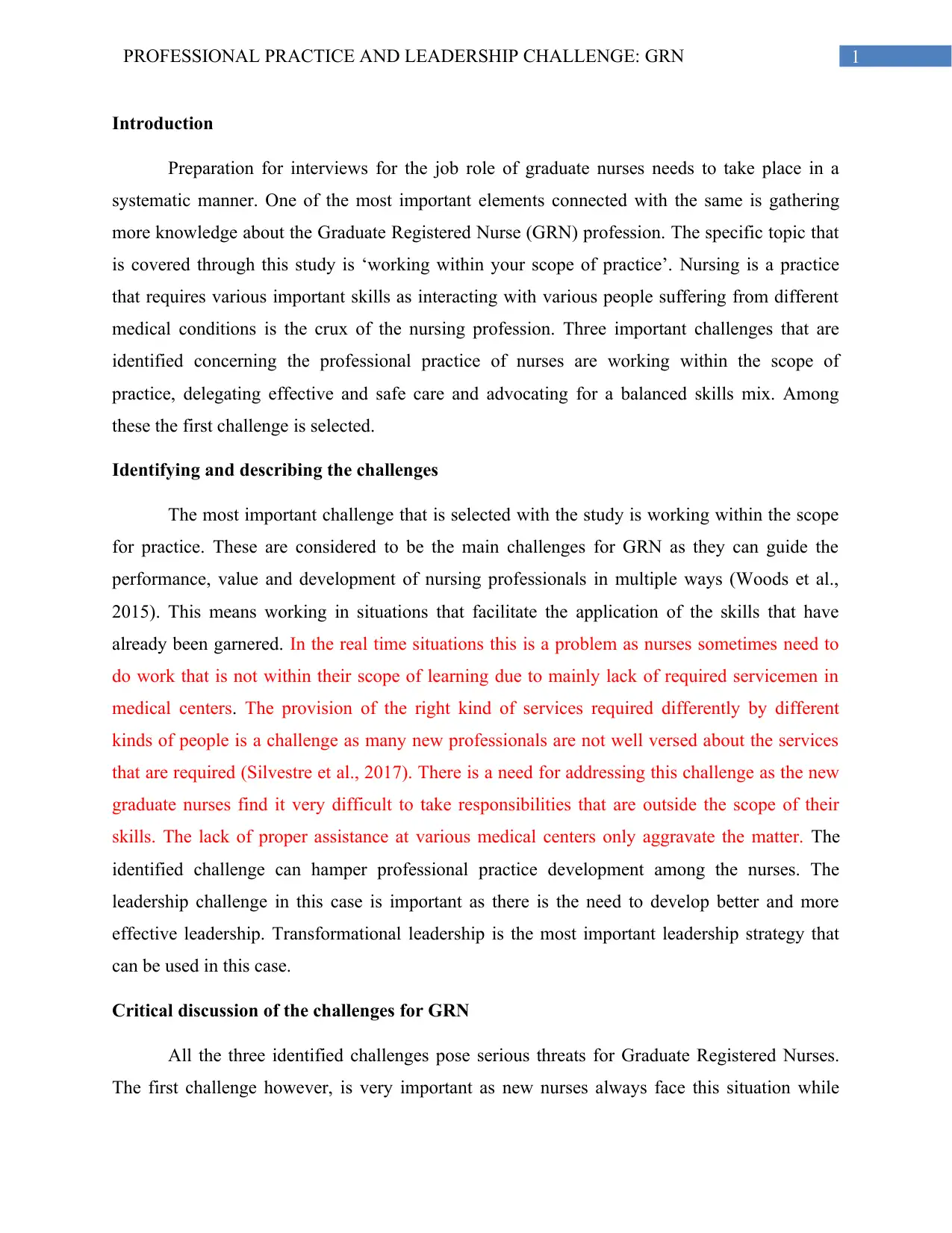
1PROFESSIONAL PRACTICE AND LEADERSHIP CHALLENGE: GRN
Introduction
Preparation for interviews for the job role of graduate nurses needs to take place in a
systematic manner. One of the most important elements connected with the same is gathering
more knowledge about the Graduate Registered Nurse (GRN) profession. The specific topic that
is covered through this study is ‘working within your scope of practice’. Nursing is a practice
that requires various important skills as interacting with various people suffering from different
medical conditions is the crux of the nursing profession. Three important challenges that are
identified concerning the professional practice of nurses are working within the scope of
practice, delegating effective and safe care and advocating for a balanced skills mix. Among
these the first challenge is selected.
Identifying and describing the challenges
The most important challenge that is selected with the study is working within the scope
for practice. These are considered to be the main challenges for GRN as they can guide the
performance, value and development of nursing professionals in multiple ways (Woods et al.,
2015). This means working in situations that facilitate the application of the skills that have
already been garnered. In the real time situations this is a problem as nurses sometimes need to
do work that is not within their scope of learning due to mainly lack of required servicemen in
medical centers. The provision of the right kind of services required differently by different
kinds of people is a challenge as many new professionals are not well versed about the services
that are required (Silvestre et al., 2017). There is a need for addressing this challenge as the new
graduate nurses find it very difficult to take responsibilities that are outside the scope of their
skills. The lack of proper assistance at various medical centers only aggravate the matter. The
identified challenge can hamper professional practice development among the nurses. The
leadership challenge in this case is important as there is the need to develop better and more
effective leadership. Transformational leadership is the most important leadership strategy that
can be used in this case.
Critical discussion of the challenges for GRN
All the three identified challenges pose serious threats for Graduate Registered Nurses.
The first challenge however, is very important as new nurses always face this situation while
Introduction
Preparation for interviews for the job role of graduate nurses needs to take place in a
systematic manner. One of the most important elements connected with the same is gathering
more knowledge about the Graduate Registered Nurse (GRN) profession. The specific topic that
is covered through this study is ‘working within your scope of practice’. Nursing is a practice
that requires various important skills as interacting with various people suffering from different
medical conditions is the crux of the nursing profession. Three important challenges that are
identified concerning the professional practice of nurses are working within the scope of
practice, delegating effective and safe care and advocating for a balanced skills mix. Among
these the first challenge is selected.
Identifying and describing the challenges
The most important challenge that is selected with the study is working within the scope
for practice. These are considered to be the main challenges for GRN as they can guide the
performance, value and development of nursing professionals in multiple ways (Woods et al.,
2015). This means working in situations that facilitate the application of the skills that have
already been garnered. In the real time situations this is a problem as nurses sometimes need to
do work that is not within their scope of learning due to mainly lack of required servicemen in
medical centers. The provision of the right kind of services required differently by different
kinds of people is a challenge as many new professionals are not well versed about the services
that are required (Silvestre et al., 2017). There is a need for addressing this challenge as the new
graduate nurses find it very difficult to take responsibilities that are outside the scope of their
skills. The lack of proper assistance at various medical centers only aggravate the matter. The
identified challenge can hamper professional practice development among the nurses. The
leadership challenge in this case is important as there is the need to develop better and more
effective leadership. Transformational leadership is the most important leadership strategy that
can be used in this case.
Critical discussion of the challenges for GRN
All the three identified challenges pose serious threats for Graduate Registered Nurses.
The first challenge however, is very important as new nurses always face this situation while
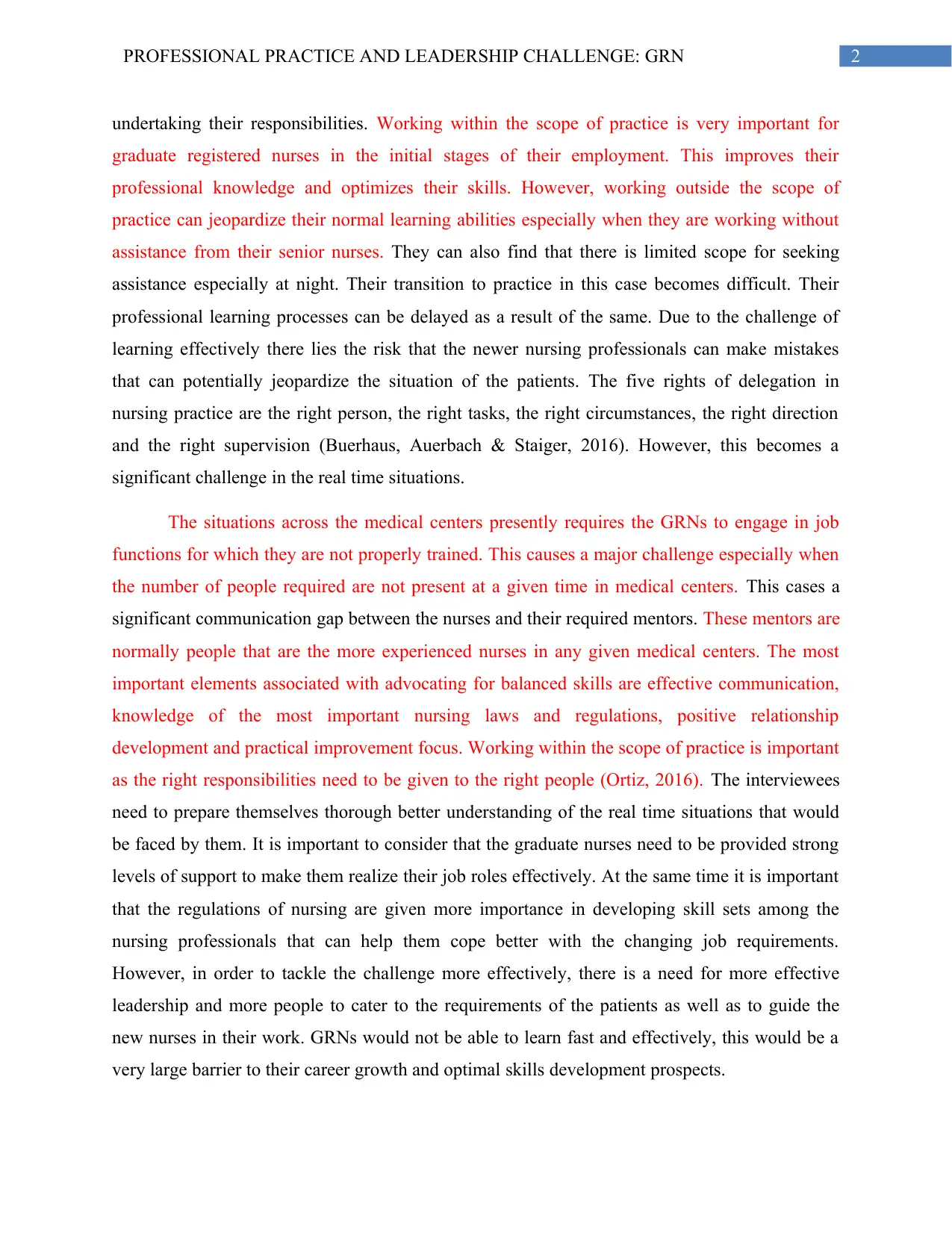
2PROFESSIONAL PRACTICE AND LEADERSHIP CHALLENGE: GRN
undertaking their responsibilities. Working within the scope of practice is very important for
graduate registered nurses in the initial stages of their employment. This improves their
professional knowledge and optimizes their skills. However, working outside the scope of
practice can jeopardize their normal learning abilities especially when they are working without
assistance from their senior nurses. They can also find that there is limited scope for seeking
assistance especially at night. Their transition to practice in this case becomes difficult. Their
professional learning processes can be delayed as a result of the same. Due to the challenge of
learning effectively there lies the risk that the newer nursing professionals can make mistakes
that can potentially jeopardize the situation of the patients. The five rights of delegation in
nursing practice are the right person, the right tasks, the right circumstances, the right direction
and the right supervision (Buerhaus, Auerbach & Staiger, 2016). However, this becomes a
significant challenge in the real time situations.
The situations across the medical centers presently requires the GRNs to engage in job
functions for which they are not properly trained. This causes a major challenge especially when
the number of people required are not present at a given time in medical centers. This cases a
significant communication gap between the nurses and their required mentors. These mentors are
normally people that are the more experienced nurses in any given medical centers. The most
important elements associated with advocating for balanced skills are effective communication,
knowledge of the most important nursing laws and regulations, positive relationship
development and practical improvement focus. Working within the scope of practice is important
as the right responsibilities need to be given to the right people (Ortiz, 2016). The interviewees
need to prepare themselves thorough better understanding of the real time situations that would
be faced by them. It is important to consider that the graduate nurses need to be provided strong
levels of support to make them realize their job roles effectively. At the same time it is important
that the regulations of nursing are given more importance in developing skill sets among the
nursing professionals that can help them cope better with the changing job requirements.
However, in order to tackle the challenge more effectively, there is a need for more effective
leadership and more people to cater to the requirements of the patients as well as to guide the
new nurses in their work. GRNs would not be able to learn fast and effectively, this would be a
very large barrier to their career growth and optimal skills development prospects.
undertaking their responsibilities. Working within the scope of practice is very important for
graduate registered nurses in the initial stages of their employment. This improves their
professional knowledge and optimizes their skills. However, working outside the scope of
practice can jeopardize their normal learning abilities especially when they are working without
assistance from their senior nurses. They can also find that there is limited scope for seeking
assistance especially at night. Their transition to practice in this case becomes difficult. Their
professional learning processes can be delayed as a result of the same. Due to the challenge of
learning effectively there lies the risk that the newer nursing professionals can make mistakes
that can potentially jeopardize the situation of the patients. The five rights of delegation in
nursing practice are the right person, the right tasks, the right circumstances, the right direction
and the right supervision (Buerhaus, Auerbach & Staiger, 2016). However, this becomes a
significant challenge in the real time situations.
The situations across the medical centers presently requires the GRNs to engage in job
functions for which they are not properly trained. This causes a major challenge especially when
the number of people required are not present at a given time in medical centers. This cases a
significant communication gap between the nurses and their required mentors. These mentors are
normally people that are the more experienced nurses in any given medical centers. The most
important elements associated with advocating for balanced skills are effective communication,
knowledge of the most important nursing laws and regulations, positive relationship
development and practical improvement focus. Working within the scope of practice is important
as the right responsibilities need to be given to the right people (Ortiz, 2016). The interviewees
need to prepare themselves thorough better understanding of the real time situations that would
be faced by them. It is important to consider that the graduate nurses need to be provided strong
levels of support to make them realize their job roles effectively. At the same time it is important
that the regulations of nursing are given more importance in developing skill sets among the
nursing professionals that can help them cope better with the changing job requirements.
However, in order to tackle the challenge more effectively, there is a need for more effective
leadership and more people to cater to the requirements of the patients as well as to guide the
new nurses in their work. GRNs would not be able to learn fast and effectively, this would be a
very large barrier to their career growth and optimal skills development prospects.
⊘ This is a preview!⊘
Do you want full access?
Subscribe today to unlock all pages.

Trusted by 1+ million students worldwide
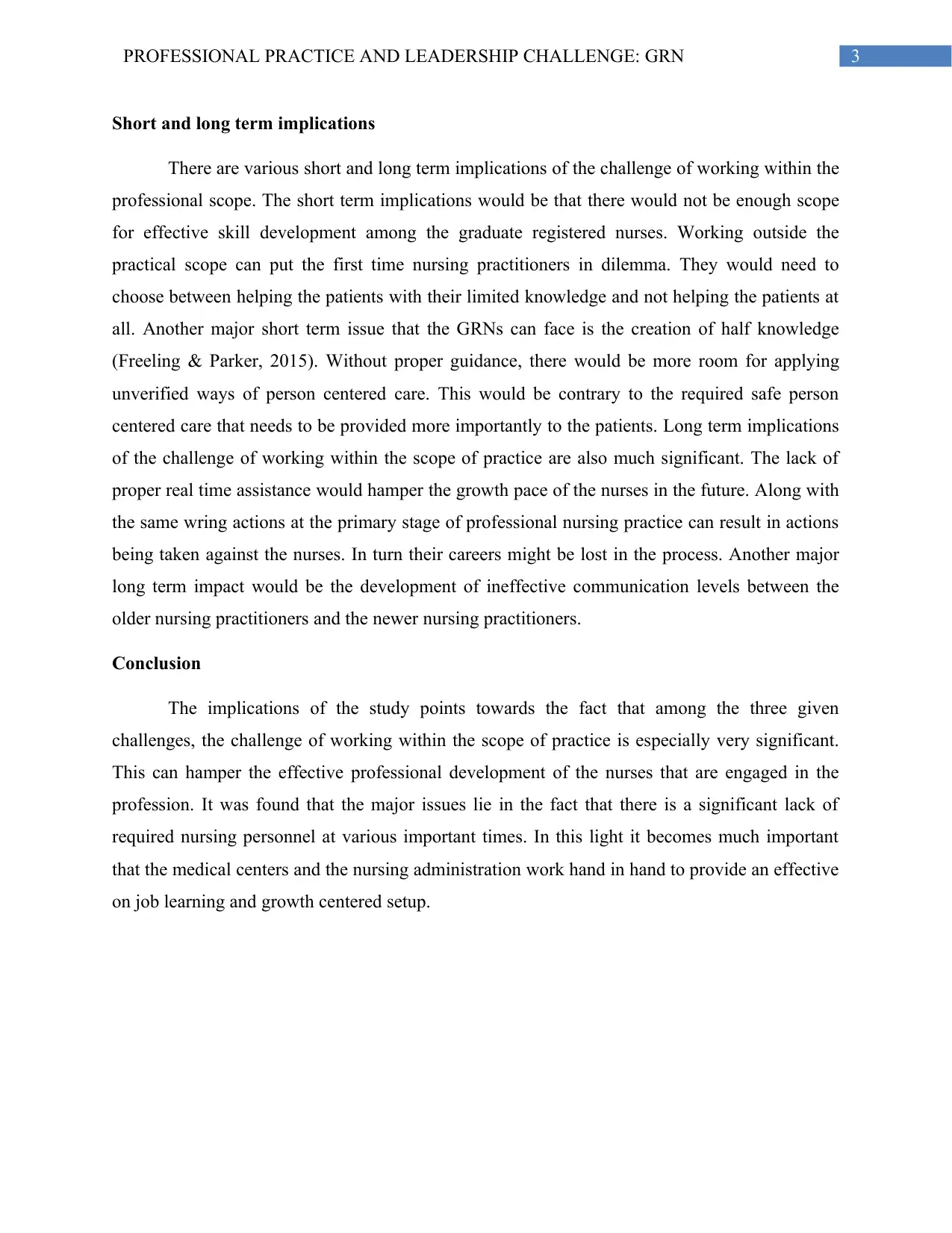
3PROFESSIONAL PRACTICE AND LEADERSHIP CHALLENGE: GRN
Short and long term implications
There are various short and long term implications of the challenge of working within the
professional scope. The short term implications would be that there would not be enough scope
for effective skill development among the graduate registered nurses. Working outside the
practical scope can put the first time nursing practitioners in dilemma. They would need to
choose between helping the patients with their limited knowledge and not helping the patients at
all. Another major short term issue that the GRNs can face is the creation of half knowledge
(Freeling & Parker, 2015). Without proper guidance, there would be more room for applying
unverified ways of person centered care. This would be contrary to the required safe person
centered care that needs to be provided more importantly to the patients. Long term implications
of the challenge of working within the scope of practice are also much significant. The lack of
proper real time assistance would hamper the growth pace of the nurses in the future. Along with
the same wring actions at the primary stage of professional nursing practice can result in actions
being taken against the nurses. In turn their careers might be lost in the process. Another major
long term impact would be the development of ineffective communication levels between the
older nursing practitioners and the newer nursing practitioners.
Conclusion
The implications of the study points towards the fact that among the three given
challenges, the challenge of working within the scope of practice is especially very significant.
This can hamper the effective professional development of the nurses that are engaged in the
profession. It was found that the major issues lie in the fact that there is a significant lack of
required nursing personnel at various important times. In this light it becomes much important
that the medical centers and the nursing administration work hand in hand to provide an effective
on job learning and growth centered setup.
Short and long term implications
There are various short and long term implications of the challenge of working within the
professional scope. The short term implications would be that there would not be enough scope
for effective skill development among the graduate registered nurses. Working outside the
practical scope can put the first time nursing practitioners in dilemma. They would need to
choose between helping the patients with their limited knowledge and not helping the patients at
all. Another major short term issue that the GRNs can face is the creation of half knowledge
(Freeling & Parker, 2015). Without proper guidance, there would be more room for applying
unverified ways of person centered care. This would be contrary to the required safe person
centered care that needs to be provided more importantly to the patients. Long term implications
of the challenge of working within the scope of practice are also much significant. The lack of
proper real time assistance would hamper the growth pace of the nurses in the future. Along with
the same wring actions at the primary stage of professional nursing practice can result in actions
being taken against the nurses. In turn their careers might be lost in the process. Another major
long term impact would be the development of ineffective communication levels between the
older nursing practitioners and the newer nursing practitioners.
Conclusion
The implications of the study points towards the fact that among the three given
challenges, the challenge of working within the scope of practice is especially very significant.
This can hamper the effective professional development of the nurses that are engaged in the
profession. It was found that the major issues lie in the fact that there is a significant lack of
required nursing personnel at various important times. In this light it becomes much important
that the medical centers and the nursing administration work hand in hand to provide an effective
on job learning and growth centered setup.
Paraphrase This Document
Need a fresh take? Get an instant paraphrase of this document with our AI Paraphraser
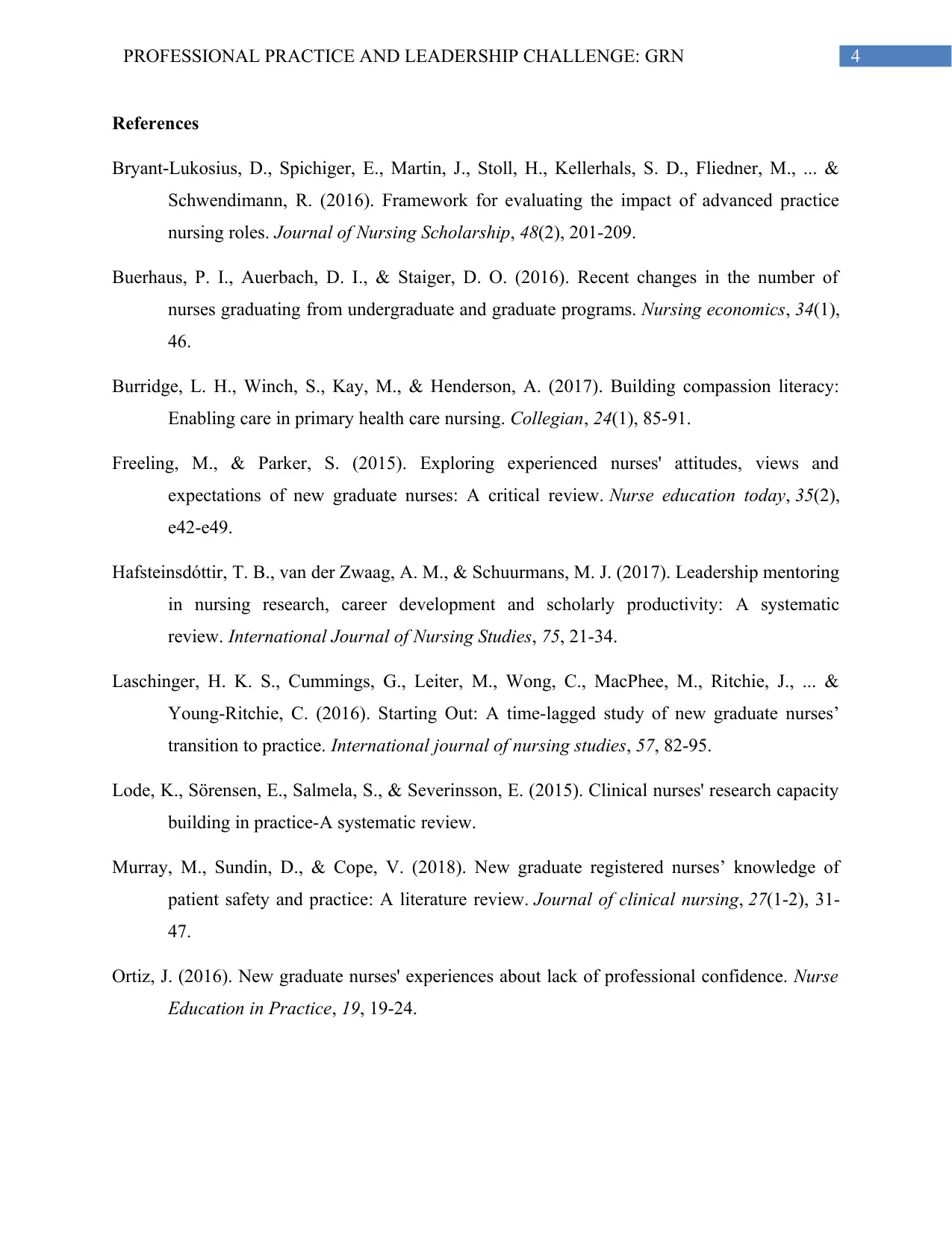
4PROFESSIONAL PRACTICE AND LEADERSHIP CHALLENGE: GRN
References
Bryant Lukosius, D., Spichiger, E., Martin, J., Stoll, H., Kellerhals, S. D., Fliedner, M., ... &‐
Schwendimann, R. (2016). Framework for evaluating the impact of advanced practice
nursing roles. Journal of Nursing Scholarship, 48(2), 201-209.
Buerhaus, P. I., Auerbach, D. I., & Staiger, D. O. (2016). Recent changes in the number of
nurses graduating from undergraduate and graduate programs. Nursing economics, 34(1),
46.
Burridge, L. H., Winch, S., Kay, M., & Henderson, A. (2017). Building compassion literacy:
Enabling care in primary health care nursing. Collegian, 24(1), 85-91.
Freeling, M., & Parker, S. (2015). Exploring experienced nurses' attitudes, views and
expectations of new graduate nurses: A critical review. Nurse education today, 35(2),
e42-e49.
Hafsteinsdóttir, T. B., van der Zwaag, A. M., & Schuurmans, M. J. (2017). Leadership mentoring
in nursing research, career development and scholarly productivity: A systematic
review. International Journal of Nursing Studies, 75, 21-34.
Laschinger, H. K. S., Cummings, G., Leiter, M., Wong, C., MacPhee, M., Ritchie, J., ... &
Young-Ritchie, C. (2016). Starting Out: A time-lagged study of new graduate nurses’
transition to practice. International journal of nursing studies, 57, 82-95.
Lode, K., Sörensen, E., Salmela, S., & Severinsson, E. (2015). Clinical nurses' research capacity
building in practice-A systematic review.
Murray, M., Sundin, D., & Cope, V. (2018). New graduate registered nurses’ knowledge of
patient safety and practice: A literature review. Journal of clinical nursing, 27(1-2), 31-
47.
Ortiz, J. (2016). New graduate nurses' experiences about lack of professional confidence. Nurse
Education in Practice, 19, 19-24.
References
Bryant Lukosius, D., Spichiger, E., Martin, J., Stoll, H., Kellerhals, S. D., Fliedner, M., ... &‐
Schwendimann, R. (2016). Framework for evaluating the impact of advanced practice
nursing roles. Journal of Nursing Scholarship, 48(2), 201-209.
Buerhaus, P. I., Auerbach, D. I., & Staiger, D. O. (2016). Recent changes in the number of
nurses graduating from undergraduate and graduate programs. Nursing economics, 34(1),
46.
Burridge, L. H., Winch, S., Kay, M., & Henderson, A. (2017). Building compassion literacy:
Enabling care in primary health care nursing. Collegian, 24(1), 85-91.
Freeling, M., & Parker, S. (2015). Exploring experienced nurses' attitudes, views and
expectations of new graduate nurses: A critical review. Nurse education today, 35(2),
e42-e49.
Hafsteinsdóttir, T. B., van der Zwaag, A. M., & Schuurmans, M. J. (2017). Leadership mentoring
in nursing research, career development and scholarly productivity: A systematic
review. International Journal of Nursing Studies, 75, 21-34.
Laschinger, H. K. S., Cummings, G., Leiter, M., Wong, C., MacPhee, M., Ritchie, J., ... &
Young-Ritchie, C. (2016). Starting Out: A time-lagged study of new graduate nurses’
transition to practice. International journal of nursing studies, 57, 82-95.
Lode, K., Sörensen, E., Salmela, S., & Severinsson, E. (2015). Clinical nurses' research capacity
building in practice-A systematic review.
Murray, M., Sundin, D., & Cope, V. (2018). New graduate registered nurses’ knowledge of
patient safety and practice: A literature review. Journal of clinical nursing, 27(1-2), 31-
47.
Ortiz, J. (2016). New graduate nurses' experiences about lack of professional confidence. Nurse
Education in Practice, 19, 19-24.
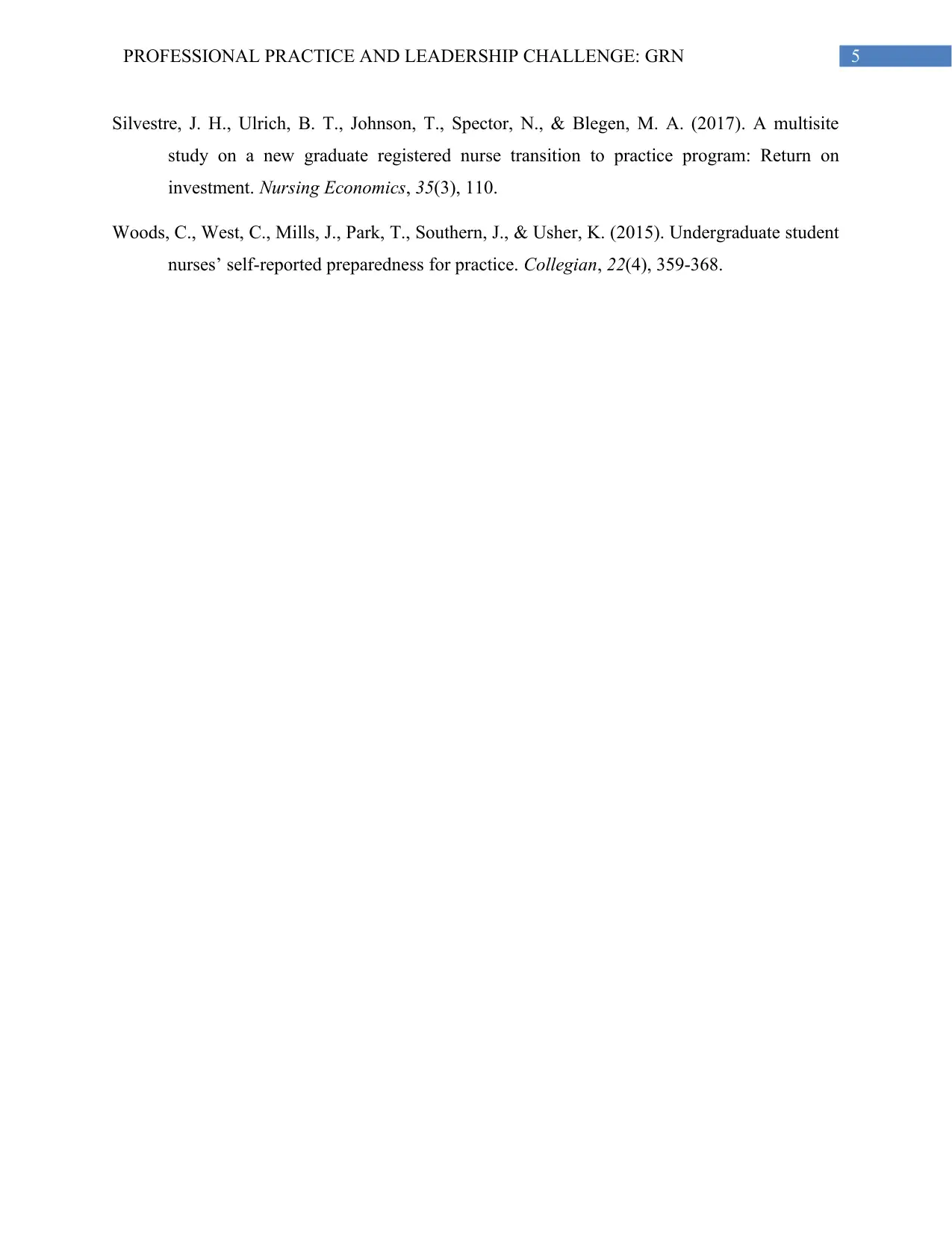
5PROFESSIONAL PRACTICE AND LEADERSHIP CHALLENGE: GRN
Silvestre, J. H., Ulrich, B. T., Johnson, T., Spector, N., & Blegen, M. A. (2017). A multisite
study on a new graduate registered nurse transition to practice program: Return on
investment. Nursing Economics, 35(3), 110.
Woods, C., West, C., Mills, J., Park, T., Southern, J., & Usher, K. (2015). Undergraduate student
nurses’ self-reported preparedness for practice. Collegian, 22(4), 359-368.
Silvestre, J. H., Ulrich, B. T., Johnson, T., Spector, N., & Blegen, M. A. (2017). A multisite
study on a new graduate registered nurse transition to practice program: Return on
investment. Nursing Economics, 35(3), 110.
Woods, C., West, C., Mills, J., Park, T., Southern, J., & Usher, K. (2015). Undergraduate student
nurses’ self-reported preparedness for practice. Collegian, 22(4), 359-368.
⊘ This is a preview!⊘
Do you want full access?
Subscribe today to unlock all pages.

Trusted by 1+ million students worldwide
1 out of 6
Related Documents
Your All-in-One AI-Powered Toolkit for Academic Success.
+13062052269
info@desklib.com
Available 24*7 on WhatsApp / Email
![[object Object]](/_next/static/media/star-bottom.7253800d.svg)
Unlock your academic potential
Copyright © 2020–2026 A2Z Services. All Rights Reserved. Developed and managed by ZUCOL.





